Showing Spotlights 1 - 8 of 65 in category All (newest first):
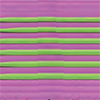 Researchers develop innovative selective-area graphoepitaxy technique to simultaneously control orientation and position of self-assembling organic semiconductor nanowires, enabling seamless integration into electronic devices.
Researchers develop innovative selective-area graphoepitaxy technique to simultaneously control orientation and position of self-assembling organic semiconductor nanowires, enabling seamless integration into electronic devices.
Jan 11th, 2024
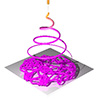 A novel method to create ultra-thin P3HT nanofibers with enhanced light harvesting and charge transport properties could potentially revolutionize organic solar cell efficiency and contribute to sustainable energy solutions.
A novel method to create ultra-thin P3HT nanofibers with enhanced light harvesting and charge transport properties could potentially revolutionize organic solar cell efficiency and contribute to sustainable energy solutions.
Dec 14th, 2023
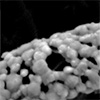 Researchers developed reusable titanium dioxide-based photocatalytic fibers decorated with gold nanoparticles, which showed exceptional ability in degrading water pollutants under UV light compared to commercial nanopowders. The innovation highlights the potential of rational fiber material design to improve efficiency and sustainability of photocatalysts for real-world water purification.
Researchers developed reusable titanium dioxide-based photocatalytic fibers decorated with gold nanoparticles, which showed exceptional ability in degrading water pollutants under UV light compared to commercial nanopowders. The innovation highlights the potential of rational fiber material design to improve efficiency and sustainability of photocatalysts for real-world water purification.
Oct 16th, 2023
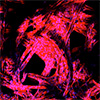 Researchers develop a new manufacturing strategy to generate tunable, durable and cell-friendly biomimetic matrices that closely recreate the multiscale structure and bioactivity of the extracellular matrix.
Researchers develop a new manufacturing strategy to generate tunable, durable and cell-friendly biomimetic matrices that closely recreate the multiscale structure and bioactivity of the extracellular matrix.
Sep 20th, 2023
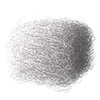 Researchers develop a simple technique for producing 3D porous fiber materials directly from solutions using a standard electrospinning setup, opening doors for customized insulation, absorbents, scaffolds, electrodes.
Researchers develop a simple technique for producing 3D porous fiber materials directly from solutions using a standard electrospinning setup, opening doors for customized insulation, absorbents, scaffolds, electrodes.
Sep 11th, 2023
 An estimated 6.8 billion face masks are used around the world each day, which ultimately are incinerated, sent to landfills or simply dumped in the environment, providing a glimpse of a forthcoming severe global environmental crisis. Many of these synthetic face masks are non-biodegradable in nature. To address this issue, researchers have developed a 3-layered biodegradable, antibacterial, breathable, herbal-extract based, and needleless electrospun face mask.
An estimated 6.8 billion face masks are used around the world each day, which ultimately are incinerated, sent to landfills or simply dumped in the environment, providing a glimpse of a forthcoming severe global environmental crisis. Many of these synthetic face masks are non-biodegradable in nature. To address this issue, researchers have developed a 3-layered biodegradable, antibacterial, breathable, herbal-extract based, and needleless electrospun face mask.
Jan 6th, 2022
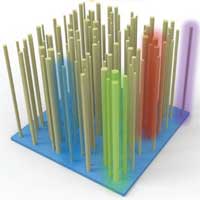 Vertical semiconductor nanowire arrays are a promising material for retinal prostheses, which could help restore the eyesight of people suffering from severe retinal diseases. These nanowires could also be used to fabricate bio-inspired photoreceptors and lightweight, highly efficient photovoltaics. In new work, scientists present theoretical and experimental studies on the microscopic optical behavior of highly dense and randomly distributed nanowire arrays embedded in a transparent polymer.
Vertical semiconductor nanowire arrays are a promising material for retinal prostheses, which could help restore the eyesight of people suffering from severe retinal diseases. These nanowires could also be used to fabricate bio-inspired photoreceptors and lightweight, highly efficient photovoltaics. In new work, scientists present theoretical and experimental studies on the microscopic optical behavior of highly dense and randomly distributed nanowire arrays embedded in a transparent polymer.
Jun 18th, 2020
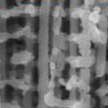 By re-designing interconnected nanowire networks, researchers fabricated novel nanostructured current collectors, which are the first to combine very high surface area, high porosity, substantially large pores and mechanical flexibility. Thanks to its ordered microstructure, the material can uniquely combine high porosity of cellular metal foams with high surface area of state-of-the-art nanoporous dealloyed metals, which allowed it to surpass the electrochemical performance of up to 300-thicker commercial electrodes.
By re-designing interconnected nanowire networks, researchers fabricated novel nanostructured current collectors, which are the first to combine very high surface area, high porosity, substantially large pores and mechanical flexibility. Thanks to its ordered microstructure, the material can uniquely combine high porosity of cellular metal foams with high surface area of state-of-the-art nanoporous dealloyed metals, which allowed it to surpass the electrochemical performance of up to 300-thicker commercial electrodes.
Jan 18th, 2019
 Researchers develop innovative selective-area graphoepitaxy technique to simultaneously control orientation and position of self-assembling organic semiconductor nanowires, enabling seamless integration into electronic devices.
Researchers develop innovative selective-area graphoepitaxy technique to simultaneously control orientation and position of self-assembling organic semiconductor nanowires, enabling seamless integration into electronic devices.
 Subscribe to our Nanotechnology Spotlight feed
Subscribe to our Nanotechnology Spotlight feed





